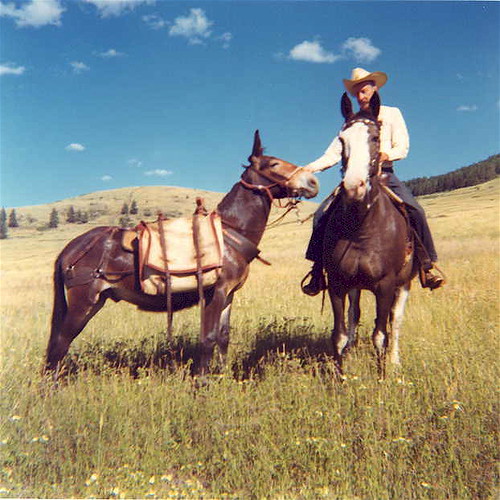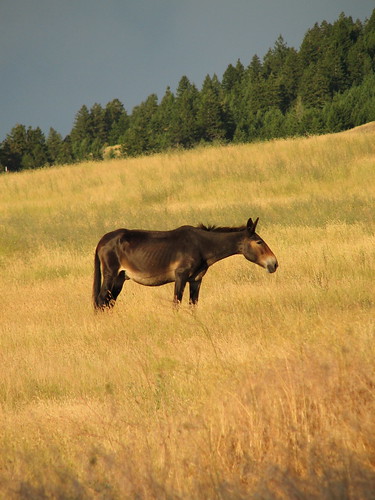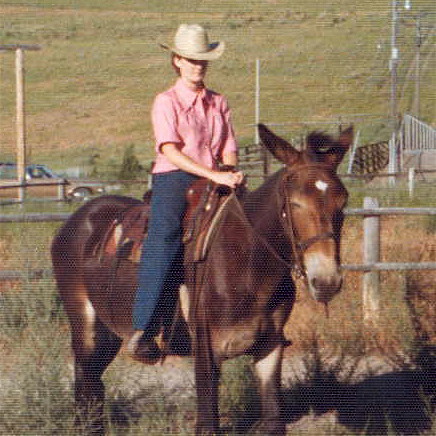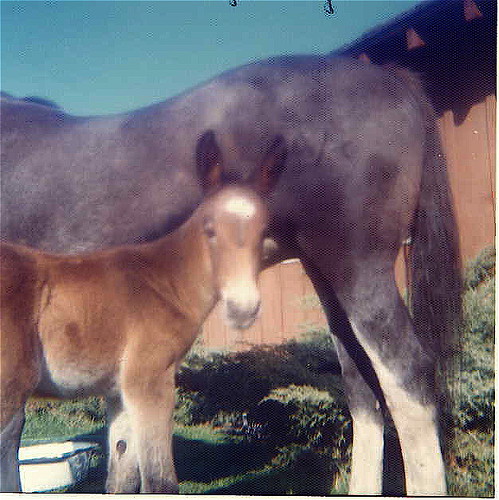Wednesday, December 14, 2005
Elegy for an elegant mule
I heard from my cousin that Burley died last week. Burley is the elegant mule, standing proudly at attention above, whose passing we mourn here.
Burley Ironsides has been a family institution since 1972. His mother was Peg LaMoose, (above the mount of my cousin GW2, the legendary zoologist cowboy.) Burley’s sire was Montana Jack, a jack donkey.
Burley’s passing gives pause. He has been a part of our family for almost 35 years. In his retirement years on the MCG Ranch, we would always seek out and greet Burley in much the way one visits a respected elder. He was unfailingly gracious and tolerant of such tomfoolery as having to sport a Santa Claus hat over one ear. The photo below of our dignified friend was taken last summer.
GW2 took Burley in his prime years along with daughter T on many an adventure in the wilderness areas of Montana. Below is T on the historic occasion of Burley’s first passenger trip.
T has some wonderful Burley memories: “From the day he was born Dad began gentling him by brushing him, scratching his ears, lifting up his feet, getting him used to the human touch. All proceeded nicely until weaning time. Burley became a little hellion, racing around the corral shaking his head and striking out with both front and hind feet. He climbed up and over the solid post and pole corral several times. Dad put snow fencing up all around the top of the corral, raising it to a height of about 12 feet.
“For several months Burley continued to be mad and there were times dad wondered if a riding mule was such a good idea after all but eventually time and hormones came under control, Burley settled down, and his training began in earnest. I was the first one to ride him as Dad figured I was lighter and would bounce on the hard ground if Burley took a dislike to the proceedings. The day arrived. We saddled up Burley, Dad got up on Mrs. Moose, looped Burley's halter rope snugly around the saddle horn and I climbed aboard Burley. His big ears went back and forth a couple of times as I talked to him and that was it. Burley was a riding mule."
T goes on to recall: “For many years Dad and I went together on pack trips into the Bob Marshall wilderness with Burley, Mrs. Moose, and Dolly Davis, who was Burley's half sister. Dad usually rode Burley but occasionally allowed me to ride him. It is true, mules are much better to ride than horses in the mountains. They have a smoother gait, are more sure footed over rough ground, and don't panic in difficult situations like fording wild rivers and plunging through belly deep mud bogs. In later years we went on pack trips with Smoke Elser, a wilderness outfitter. Many of Smoke's pack animals were Burley's half brothers and sisters. Burley always became the favorite of the wranglers and the paying dudes on these trips.
“At home Burley's favorite place to hang out on hot summer days was the brick sidewalk directly in front of the front door. Anyone coming or going from the house was given the option of ducking under Burley's neck or sidling around his backside. We figured it was a good way to screen visitors.
“Whenever Burley was far out in the pasture, all Dad had to do was holler
"C'mon Burley!". Burley's head would come up, his long ears would point
forward and he would come to Dad.”
When Burley was born in 1972 (see above for Burley’s first hours), the world did not stop to take note. Nor did we “kids” understand that Burley would come to represent a world that our parents showed us and that we now value in a way that is impossible to describe. My cousins, my brother and I all grew up in Montana with parents who saw the last of the Montana frontier. These were magnificent people who fought in WWII, miraculously survived, and came back to Montana to forge lives in business and academia that were still rooted in their pioneer heritage. In their “spare time,” they built log cabins, preserved open space, wrote books, and told the stories of their grandparents who had come to the west with nothing but hope. And they took us, many times, to the wild places we would otherwise never have known.
Burley, the seemingly immortal pack mule, always seemed to represent those remote, pristine places of our youth. Even those of us who never took a pack trip with Burley (God help me, I was living in Chicago when Burley was born,) came to understand that Burley represented a wilderness ethos that we would have to try to keep alive for the next generation.
Now our gentle friend is gone. The fuzzy colt has lived a lifetime and so, it seems, have we. The legacy we can pass on is the experience of pristine places. Part of our job here on earth is to protect these places so they can remain forever.
T sent a quote from "The Outermost House" by Henry Beston:
“We need another and a wiser and perhaps a more mystical concept of animals. Remote from universal nature, and living by complicated artifice, man in civilization surveys the creature through the glass of his knowledge and sees thereby a feather magnified and the whole image in distortion. We patronize them for their incompleteness, for their tragic fate of having takenform so far below ourselves. And therein we err, and greatly err. For the animal shall not be measured by man. In a world older and more complete than ours they move finished and complete, gifted with extensions of the senses we have lost or never attained, living by voices we shall never hear. They are not brethren, they are not underlings; they are other nations, caught with ourselves in the net of life and time, fellow prisoners of the splendor and travail of the earth.”
"At home Burley's favorite place to hang out on hot summer days was the brick sidewalk directly in front of the front door. Anyone coming or going from the house was given the option of ducking under Burley's neck or sidling around his backside. We figured it was a good way to screen visitors."
I love your sense of humor! The only other comment I can say is "keep writing!"
What you say about the land and the connections to it is very insightful. This tie becomes stronger every year, thanks to family and to mountain horizons that stay constant in an ever-changing world.
<< Home




